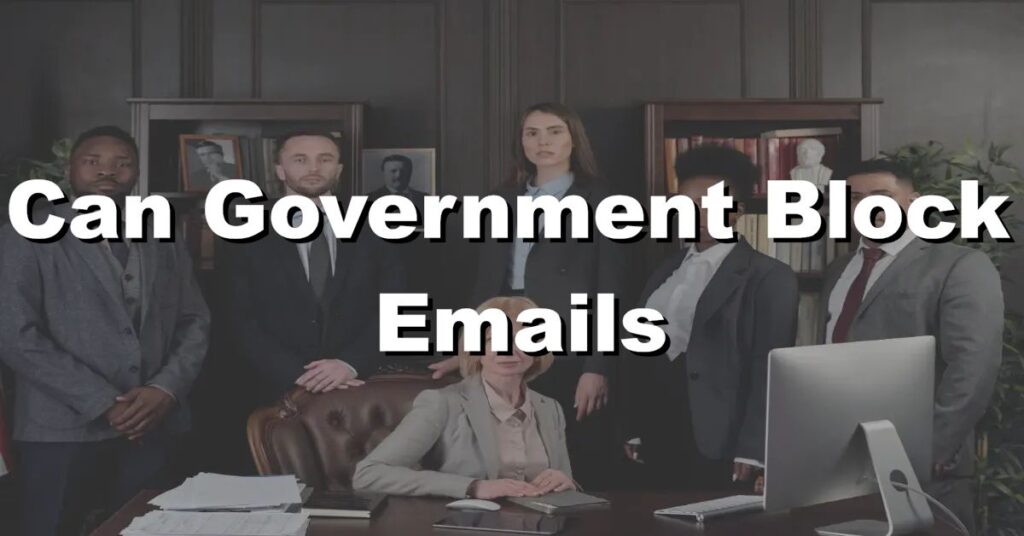With the increasing prevalence of email as a communication tool, people are starting to wonder if the government has the ability to block their emails. This can be a major concern for those who rely on email for their personal or business affairs. In this blog post, we will explore the legality and procedures surrounding government access to email, as well as what steps you can take to protect your privacy.
The Legality of Government Email Monitoring
The legality of government email monitoring varies across different jurisdictions and is subject to specific laws and regulations. In many countries, governments have the authority to monitor email communications under certain circumstances, such as national security concerns, criminal investigations, or intelligence gathering.
These legal provisions aim to protect public safety, prevent terrorism, and combat illicit activities.
However, the extent of government email monitoring can be a subject of debate, as privacy concerns come into play. Critics argue that unrestricted monitoring can infringe upon individuals’ privacy rights and undermine the principles of a free and open society. Balancing the need for government surveillance and individual privacy is crucial in upholding the rule of law and protecting civil liberties.
Tips for Preventing Government Blockage
While government email monitoring may be lawful in certain situations, individuals and organizations can take steps to protect their email communications and minimize government interference. One approach is to use encryption technologies to secure email content and prevent unauthorized access.
Encryption can make it significantly more difficult for third parties, including government agencies, to intercept and decipher email messages.
Another important consideration is to use secure email providers that prioritize privacy and employ robust security measures. Researching and selecting email service providers that offer end-to-end encryption, strong data protection practices, and transparency about their privacy policies can help mitigate the risk of government interference.
The Ethical Debate on Government Email Monitoring
The ethical debate surrounding government email monitoring centers on the tension between security and privacy. Supporters argue that government monitoring is necessary to prevent acts of terrorism, protect national security, and ensure public safety. They believe that the potential benefits outweigh the intrusion on privacy, as monitoring can help identify and prevent criminal activities.
However, critics contend that widespread and unchecked government email monitoring can lead to a surveillance state, erode individual freedoms, and undermine trust in government institutions. They emphasize the importance of privacy as a fundamental human right and express concerns about potential abuses of power and the chilling effect on freedom of speech and expression.
The Future of Email Privacy and Government Blockage
The future of email privacy and government blockage is likely to be shaped by evolving technologies, legal frameworks, and societal attitudes. As encryption technologies become more advanced and widespread, individuals and organizations may have access to stronger tools to protect their email communications from unwanted government interference.
At the same time, governments may adapt their approaches to align with changing technologies and legal considerations. Striking the right balance between security and privacy will be crucial, and there may be a growing emphasis on establishing clear guidelines, oversight mechanisms, and transparency regarding government email monitoring.
The Impact of Government Email Monitoring on Civil Liberties and Democracy
Government email monitoring can have significant implications for civil liberties and democracy. Excessive monitoring can erode individuals’ privacy, stifle freedom of speech, and create a climate of self-censorship. When people feel that their communications are being scrutinized, they may be less likely to express dissenting opinions or engage in open and honest discussions.
Moreover, the widespread perception of intrusive government surveillance can undermine trust in democratic institutions and lead to a decline in public confidence. Transparency, accountability, and clear legal frameworks are essential in preserving civil liberties and ensuring that government email monitoring is conducted within the bounds of the law and with appropriate oversight.
Conclusion
While the government has the power to monitor electronic communication for national security purposes, it is not legal for them to block or censor emails without a court order or due process. However, there are exceptions to this rule in certain cases of cybercrime or hacking attempts.
It’s important to understand the laws and regulations surrounding electronic communication and privacy to protect yourself from potential government interference.

